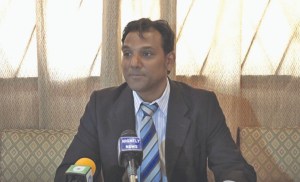Despite the absence of basic information to verify its authenticity, such as where it gets its funding from or who trained its polling agents, a one man representative of a little known group has released preliminary findings from an opinion poll it claimed to have carried out in Guyana.

The results of the ‘poll’ was announced on Monday by Dr Kirk Meighoo of “Turkeyn Research and Polling Institute” but when asked how many persons were to be interviewed, he had replied “several hundreds”.
Yet in his announcement of the “findings” he asserted that 1400 persons were interviewed in all of the ten administrative regions of Guyana. He asserted that there were 12 interviewers but yet could not identify their deployment in the specific regions. He also asserted that the sample was stratified to include the exact percentage of ethnic groups as found in the 2012 census but unless individuals were selected by sight at the point of interview, it is difficult to see how they could have been preselected randomly.
Discussing the poll, one respected local social scientist questioned the relevance of the questions concerning the popularity of the candidates, who had been passed over by the Central Committee of the Peoples Progressive Party, when the majority of them for the presidential candidate as the party was pushing for elections within three months as constitutionally stated following the passage of a No Confidence Motion. This was seen as an attempt at creating discord within the party at a critical juncture.
Among the findings of the ‘poll’ was that most persons want elections as soon as possible and they have a negative view of the government’s failure to call elections.
Another finding of the ‘poll’, which was done through face to face interviews, was that citizens have a lack of optimism that the recent oil finds and the wealth it generates will make any difference at the grass root level.
When questioned by the media, however, Meighoo struggled to defend the authenticity of the poll or answer basic questions such as who organised and funded the poll. Asked how he could guarantee the veracity of the results, Meighoo claimed to be able to tell when poll results are fake. He emphasised that he was just a “consultant”, but this was belied by the fact that he appeared to be completely at sea on the concrete details of the poll.
“You can tell when its fake results. The way the data is collected. You can tell by that. You can tell if it was done in an actual exercise or whether it was done in an office. So that’s part of it. I did speak to some of the surveyors and I met some of them. I couldn’t meet with everyone, but I did spot check,” he said.
But Meighoo was clearly protesting too much about the TRPI polls being “fake”, when no one actually suggested it.

























